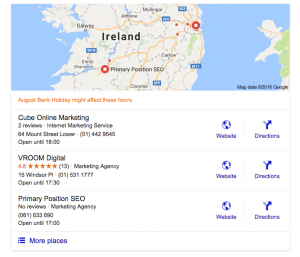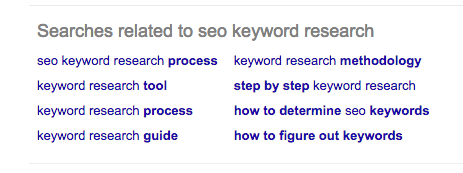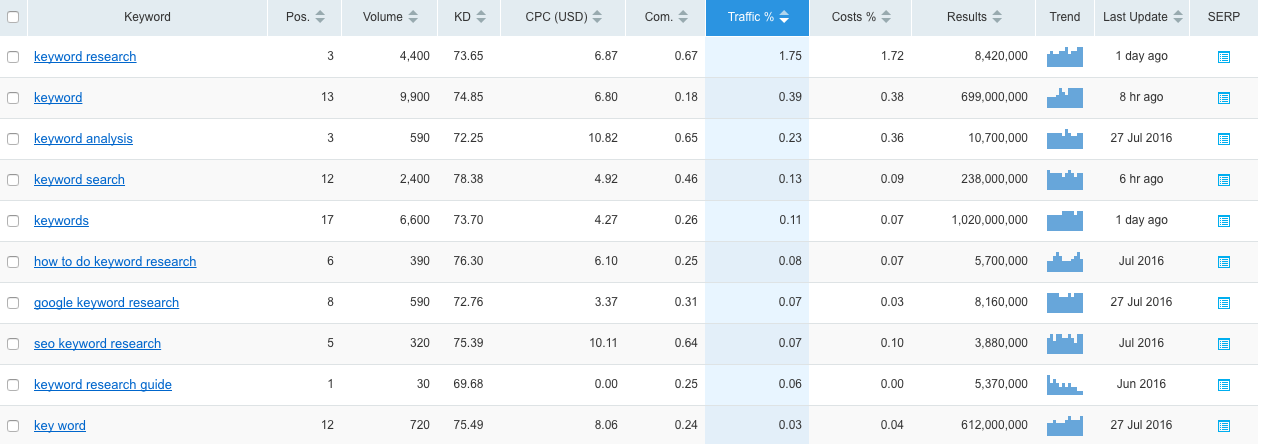Keyword research is the most important element in any SEO campaign.
Google’s search results are based on keywords.
Type them in, get the results.
No research = no dependable keywords, no title tags, unfocused blog calendar, missing opportunities.
Keyword research done right = easy planning, a list of content titles, services or products laser targeted, and security from knowing you are investing wisely.
It is great being at the top of the search results. But you can be at the top of Google’s search results and still have no traffic – it depends on the keywords you optimise for.
Diving into Keyword Research
The foundation of any website seeking traffic from Google lies in keyword research. This research is also useful for running AdWords campaigns and establishing your internal linking strategy.
Where should you begin?
While Google Keyword Planner is often the go-to starting point, it’s actually better to save it for later in the process.
Truthfully, it’s a terrible place to start.
For instance, if you type “keyword research” into the planner, it won’t generate the keywords we’ll easily discover below.
Google Keyword Planner delivers identical results to everyone, which means you and thousands of others will be competing for the same traffic.
This article will guide you through the process of optimizing this post for “keyword research.”
First, enter the term into Google and browse the websites in the search results. Immediately, it becomes clear that ranking for keyword research won’t be easy, as the first page is populated with large websites boasting thousands of links.
Head, Body, and Tail Keywords
Keywords can be classified into three main categories:
Head Keywords:
These highly competitive keywords often have low buyer intent, such as insurance, gambling, or SEO agency. Despite generating massive traffic, these terms typically have poor conversion rates.
Body Keywords:
Body keywords can still be quite competitive. For example, there are significantly more searches for SEO than SEO companies. On Google Ads, SEO costs €2.73 per click in Ireland, while SEO company costs €4.87 (traffic 2,900 and 260).
Body keywords usually comprise 2 or 3 words, possess strong buyer intent, and generally receive a few thousand searches per month (although SEO isn’t the best example).
Tail Keywords:
Long tail keywords contain 4 or more words and are usually specific, accounting for the majority of Google’s searches. While a single page might not attract substantial traffic, the combined effect of these keywords can generate impressive traffic numbers.
It’s evident from the above that focusing on Body and Long Tail keywords is a more effective investment of your efforts. In fact, with a bit of creativity, you can utilize both types on the same page.
Pay attention to the suggestions in Google while you are typing. Google suggest will show related keywords.
I want to avoid tools; I am promoting a service – though these other suggestions could be the title for a post at some point on keyword tools we use. I scan down the search results again, and once again I am competing with mega websites for the term keyword research for SEO. So be it. The first Irish website is listed at position 23.
I now have my second root term and I will build out a list using these two. But I am going to add another to it, “keyword research for Adwords” – SEO and Adwords are my main business, so let’s see if the post can rank for both.
I now have 5 terms on my list – the main keywords prefixed and suffixed with SEO and Adwords and I am keeping the root term keyword research.
More Google Suggestions
Enter each of the terms you have now into Google and scroll to the end of the page. You will see something like this:
I now have eleven keyword terms on my list.
Back to Google’s search results.
Scan down the page looking at the titles of the search results. The first three results start with “How to do” – I can prefix this to some of my keywords.
How to Determine Your Competitors’ Keywords?
Your online and offline competitors might not be the same businesses. To identify your online competitors, search for your target keyword on Google.
Visit their website and skim the page. Firstly, take note of the title tag and any other keywords in the description.
Pay attention to the keywords used in the headings and subheadings, and add them to your keyword research list.
Interestingly, in optimizing this post, the term “keyword research of competitors” frequently appears in the titles and throughout competing pages.
With your list of competitors in hand, start utilizing these keyword research tools:
SEM Rush is an excellent SEO software. Input each competitor’s domain or URL into their search box.
The platform will generate a list of organic keywords for which the page or domain ranks, along with other helpful data.
With a paid account, you’ll also gain access to all the keywords being targeted in Google Ads. You’ll often find more keyword information through AdWords competition research. Additionally, SEMRush displays the ads your competitors are using.
Similar services include Keyword Spy and SpyFu. Although SpyFu is a personal favorite, it only covers data for the US and the UK.
A key challenge in conducting keyword research in Ireland is the scarcity of data. While the aforementioned tools are valuable, search volume from SEO and Google Ads in Ireland is often so low that these keyword research tools struggle to provide sufficient data.
Check Keyword Anchor Text
The anchor text of links pointing towards your competitor’s domain or URL is a clear pointer to the keywords they want to rank for. Most anchors should be the domain name, company name, some irrelevant, and stuff like click here. That makes it easy for the important anchors to stand out.
Go to Majestic and enter the domain or URL and then proceed to Anchor Text in the Menu.
This is the type of keyword cloud they will display at the top.
It is fairly obvious from the cloud that most links to this page are using either the domain name, and or research, keywords, guide, and definitive.
Taking on Backlinko head to head is not a good use of resources, this is simply an example of what you can see with your competitors.
Below the cloud on Majestic, they list all the anchors and how many times it has been used.
As you find relevant anchors add them to your list.
Value of Keywords
It is only worth ranking for a keyword if that keyword has value to your business. There is little point ranking for “Leslie Gilmour’s post on keyword research…”
We can estimate this value now by taking all the keywords you have and adding them to Google’s Keyword Planner.
The above screenshot from Keyword Planner shows the number of searches per month, Competition, and Suggested bid.
In general, the suggested bid is the best indicator of how valuable a keyword is in its niche market.
Google’s Average Monthly Search figures are quite accurate, but they can be off – high or low.
The Competition ranking is Adwords related and not organic search. It is much better to test keywords in Adwords before committing to a long and more expensive SEO campaign.
I have a limited campaign running in Adwords for SEO audit, Monday to Friday and only during office hours – it is one of my main services. It can be seen from this campaign that the number of searches for SEO audits is higher than the estimates in the keyword planner. This is good, I would hate to build a website based on that data to find out it was lower.
Once you have decided on keywords that are right for your page make sure the keywords are included in the page text. Too often I see words added to Title tags and then not included in the page text.
Commercial Intent
Buyer intent is one of the most important signals. Keywords will fall easily into four different categories: tire kickers, informational, products, and buy now
Let’s get the rubbish out of the way quickly.
Tire Kickers
These are keywords that you will add as negative keywords in your Adwords account:
- Free
- Download
- Torrent
There can be huge traffic from these terms, but good luck trying to make money out of them.
Informational
Many blog posts will end up targeting this area:
- How to
- Benefits from
- 10 Ways to
You get the idea. This post is informational.
Informational can work very well bringing first-time visitors to your site, then helping to build an email list, or even understanding how much work is in something and therefore contacting you.
Converting informational visitors to users or buyers can take a while, but it is needed if you are running any inbound or social media campaigns.
Product Keywords
Product keyword focuses on brands, categories, and specific services, (especially when the service have a location name like Dublin).
- Product name – esp. important in e-commerce
- Best
- Review
- Brand name + search term
Usually, these searchers are still at the comparison stage, and maybe even price shopping. But they will convert if you can put forward a great landing page.
Buy Now Keywords
I think of these searches like I would be. I have been thinking of buying for a while, I am now ready to pull the trigger, I have looked at lots of different sites, and I can’t remember any of those sites.
I start searching all over again:
- Buy
- Product name + 24 hours delivery
- Discount
I, like most, would have will already have my credit card sitting on my desk in front of me. These keywords convert extremely well.
Remember the value of keywords. Check these keywords in GKP for the CPC.
Setup Google Adwords to Test
This will only cost a few hundred Euro.
Set up an ad group based on the keywords in your list. Use less than 20 words. Write your adverts and start testing.
The aim of the test is twofold: confirming the amount of traffic for the words, and confirming you have buyers or enquiries from these terms.
Lots of traffic, lots of clicks, no buyers, and a high bounce rate will confirm quickly you have more work to find the right target keywords or your landing page is not appropriate.
If you have gone through the above process correctly, you will get converting traffic. Measure the profit on 200 to 300 clicks. For example:
- 300 clicks produced €1,000 in sales with €600 in profit
- one click is worth €2
Therefore:
On 1,000 searches per month, at number 1 in the search results, you can expect about 15% of the traffic, which is €300 per month in expected profit.
Add your own numbers per URL on your website.
Remember Keyword Planner’s results are only an exact match – so there will be many more related searches.
Keyword Difficulty
It has been said that Google does not rank websites, that it ranks pages.
That was true in the past – not now. Authority websites are ranking pages simply down to the number of links to the root.
It is even more difficult if you are selling brand products where Google is like to list 5 or 10 pages from the brand website completely excluding independent websites from the first page.
Massive websites with lots of great quality links are going to win over your site that has only a few hundred links.
This means you have to carefully pick your competitors. (something I am not doing with this post)
Referring Domains
Install the Majestic plugin. Even if you don’t have an account with them you will see some limited data.
If all the websites you are intending to compete with have thousands of links or are well known brands, it is unlikely you will have success.
In this case take some time and find keywords that are less competitive.
Long Tail Keywords
Long tail terms are usually great for blog posts. It is great to create a post and see it gain traffic month after month – really it has to, there is so much work now in creating a great post the return has to be there.
This section will be covered in depth in another post. But here are some places to find long tail keywords.
https://www.quora.com/topic/Keyword-Research
http://boardreader.com/s/keyword%20research.html
https://ubersuggest.io/
http://answerthepublic.com/
Is the Keyword Increasing or Decreasing in Value?
One last place to check before pulling the trigger is Google Trends.
It can be seen from the above graph that the searches for keyword research peaked in August 2010 and after a drop has remained fairly steady. I am surprised by this information. I would expect more people to be researching now that more knowledge about SEO.
Using Google Search Console
In the new search console filter with the following words to find questions that you don’t at the top rank for What, Who, When, Where, Why, Can, Are, How, Improve, Get Better, Get More. This allows you to use Google Search Console for content ideas.
Any thoughts? What do you do differently?

I am the founder and manager of BeFound SEO and the main consultant. I started offering SEO services back in 2007 when I had to explain SEO, as most people had no idea what it was and how much it could help their business online. I still love seeing the results from SEO.
When I’m not creating great strategy, I am usually out hiking up a mountain.
Connect with me on the links below.






